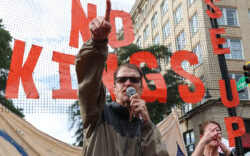“It ain’t over ‘til it’s over,” said baseball great Yogi Berra. The Nov. 3 contest between President Donald Trump and his Democratic opponent, Joe Biden, turned into an all-nighter and a nail-biter that ain’t over yet as I write this column on Nov. 4.
Biden right now has a lead in the popular vote, but the White House prize goes to the candidate who gleans the most votes in the Electoral College, where 270 votes is the magic number to win. As of this writing, Biden leads in enough swing states to put him over the top, but that could change as election tallies come in from a handful of battleground states—including, surprisingly, Georgia, where Republican candidates have won every presidential election since 1996. But Trump has claimed victory in Georgia anyway, and he is threatening to challenge the results in Wisconsin and Michigan and trying to halt counting in Pennsylvania.
America is an angry and anxious country during this year of politics and pandemic. President Trump did nothing to calm the discord as the votes rolled in from some states while millions of other ballots were not yet counted in others. As Biden counseled patience, Trump walked onstage in the White House in the wee hours of Nov. 4 and launched into a dyspeptic diatribe reminiscent of a tin-horn despot from some banana republic backwater dictatorship.
“This is a fraud on the American people,” he huffed. “This is an embarrassment to our country. We were getting ready to win this election. Frankly, we did win this election… We want the law to be used in a proper manner, so we’ll be going to the U.S. Supreme Court. We want all voting to stop. We don’t want them to find ballots at 4 o’clock in the morning and add them to the list.”
Since record numbers of Americans voted by mail or by absentee ballot this year, a presidential call for “all voting to stop” is an authoritarian sentiment from the chief executive of a country that is supposed to be a democratic republic. For President Trump to assail the election as “a fraud on the American people” and “an embarrassment to our country” is a mordantly ironic statement coming from a president who has himself been a fraud and an embarrassment to millions of Americans who remain aghast at the corruption, contumely and cronyism of the Trump administration. Still, Trump will always play to his cultish base of voters, his hard-core supporters who go right along with the mendacious, the malicious and the militias that Trump stirs up with his endless rallies and incessant bellicosity.
No matter how the 2020 election turns out, there are frightening forces in this land that will linger long after all the ballots are counted. White supremacists and militia groups have long felt emboldened by Trump in the White House, and they could turn into sore losers with guns if their man Trump is forced to vacate the premises.
Still, there are signs of hope no matter who wins this presidential election. Millions of Americans are questioning the usefulness of the Electoral College that can award the presidency to the person who comes in second in the popular vote tally, as Trump did in his 2016 campaign against Democrat Hillary Clinton. The old civil-rights-era call for “one person, one vote” is echoed by those who want a popular vote so that the ballot of a voter in Manhattan, NY counts the same as a vote in Manhattan, KS. Other reforms that could come about from this year’s election include easier and more accessible voting and much-needed scrutiny of the Supreme Court in a time when justices are appointed for life with no term limits and “activist judges” are welcomed on the high court as long as they are activist toward a conservative agenda of curtailing Obamacare and abolishing the Roe v. Wade decision that established a right to abortion.
Historians one day will judge this president and this nation. Longtime Washington journalist Elizabeth Drew asked in 1975 how future historians might judge President Richard Nixon’s Watergate scandal. Her questions still apply today with a different Republican in the White House: “Will they know how it felt to be stunned—again and again—as we learned what had been done by people in power? Will they understand how it felt… when it seemed that there were no checks on power?”
Like what you just read? Support Flagpole by making a donation today. Every dollar you give helps fund our ongoing mission to provide Athens with quality, independent journalism.









